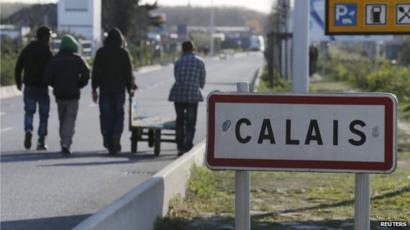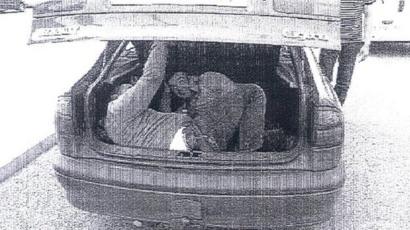By Jane Deith, UK

Up to 100 Britons are thought to have been jailed in France in the last year for trying to smuggle migrants through Calais to the UK, the BBC has learned.
Most of them had hidden the migrants in their own cars, prosecutors say.
Car and van drivers, instead of lorry drivers, are increasingly being recruited by smuggling gangs.
The deputy prosecutor for the Calais region's main court said she saw between five and 10 smugglers from the UK every month.
Julie Colaert told the BBC's File on 4 programme that people from the UK now made up a quarter of those brought before the court - second only to smugglers from Eastern Europe.
"In the last two years we have seen more and more English smugglers," she said.
"Trafficking gangs are employing them to take people across in their own cars.
"The migrants pay a lot of money because it's sold as guaranteed passage to the UK."
Iraqis in boot
She estimated that up to 100 people from the UK had been convicted by the court in the past 12 months.
She gave an estimated figure because, she said, in France it is illegal to record statistics by nationality.

In the most recent case, Basir Haji, from Preston in Lancashire, was sentenced to 12 months in prison.
He was caught at the Calais ferry terminal with two Iraqi men hiding in the boot of his car.
He admitted agreeing to smuggle them to the UK for £500 (698 euros).
The Iraqi men told the police that their families had each paid £4,500 for them to be transported to the UK.
Haji was convicted of trying to facilitate the entrance of foreign citizens in circumstances incompatible with human dignity.
Organised gangs
Haji spoke to the BBC before he was taken to a prison south of Calais.
"I'm in debt. That's why I did it. I've been playing a lot of money in the casino," he said.

The judges suspected Haji may have successfully smuggled migrants into the UK on a previous day trip to Calais, in April.
Haji told the court there were three men above him in the smuggling network.
And he told the BBC he believed the head of the gang was based in England.
Julie Colaert said that the number of Britons charged with smuggling migrants across the Channel had increased significantly in the last two years.
In the past criminal gangs had hidden migrants in lorries, but now the use of private cars and vans was more common, as people believed they were less likely to be stopped or searched.
Recruiting the smugglers
Europol, the European Union's law enforcement agency, has confirmed that organised criminal gangs and opportunistic individuals based in the UK are involved in smuggling illegal immigrants into the country.
The French lawyer who represented Basir Haji at his trial said the recruitment of people smugglers had evolved in recent years.
Emmanuelle Osmont said that mafia organisations were now targeting students with financial difficulties, and bar owners and shopkeepers whose businesses were struggling.
The criminals start by presenting people-smuggling as a means of making extra money.
"The first approach might be in a café," said Ms Osmont.
"They make friends... and bit by bit they become interested in them, asking them about their personal and professional situation.
"It can take weeks, but when they have formed enough of a bond, they present the human trafficking as a way of helping friends or family fleeing war or persecution."
'Armed and dangerous'
The drivers recruited by the gangs earn between about £2,100 and £2,800 per trip.
Many may make one trip without being caught, but are stopped on a second or third attempt.
The sentences they receive range from six months to two years in prison.
According to Ms Osmont, the recruits know that their behaviour is illegal but are told that the risk of being caught is minimal.
But working with these mafia gangs, who are armed and dangerous, is risky in itself.
"They threaten people and their children. Once you start working with them, they'll never let you go," Ms Osmont warned.
File on 4: Ticket to Hide is on BBC Radio 4 at 20:00 BST on Tuesday, 23 June and available later via BBCiPlayer.
No comments:
Post a Comment